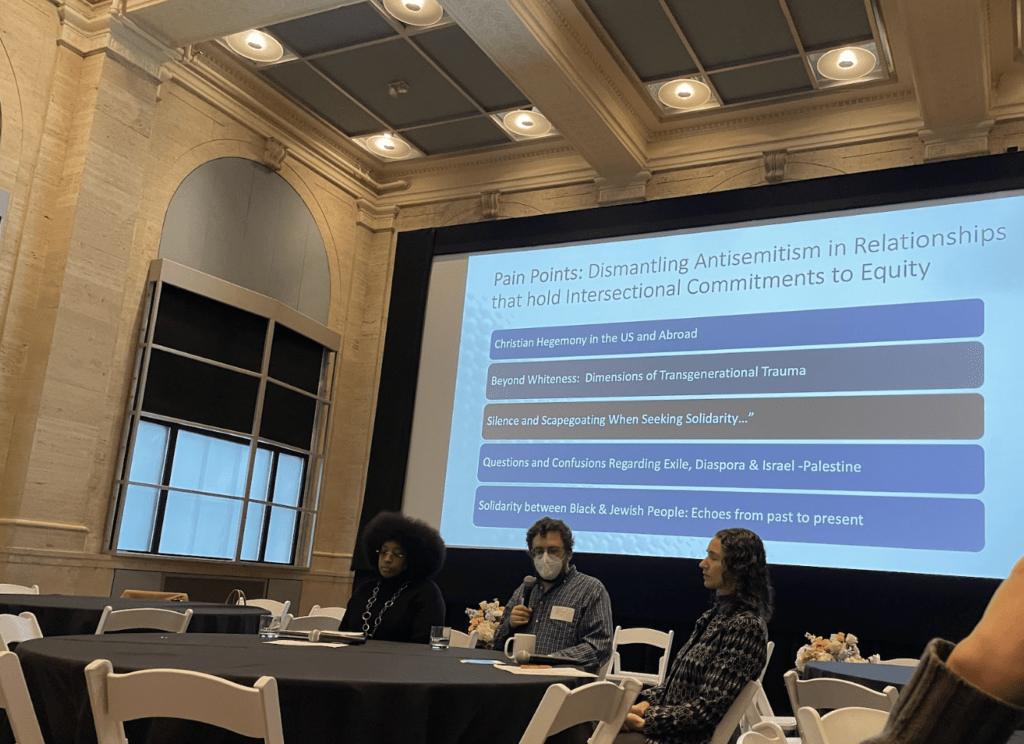SOA Assembly Examines Antisemitism, How to Fight It
With antisemitism on the rise in the U.S., School of the Arts faculty, staff, and students came together with two analyst/activists on March 30 to discuss how artists, scholars, educators, and citizens are called to action to combat it.

After recently speaking to students about antisemitism at Emerson, School of the Arts Dean Rob Sabal felt compelled to discuss the issue with the entire SOA community at the annual assembly. Previously, the assemblies had been learning opportunities exclusively for full-time faculty.
Anti-Jewish acts of violence hit an all-time high in the U.S. in 2022, according to the Anti-Defamation League. Ben Lorber, a senior research analyst at social movement think tank Political Research Associates, said antisemitism is an ideological conspiracy theory, something that can appeal to people in times of crisis, discontent, or inequality, or when people feel alienated.
“It’s a simplified explanation of how the world works in which we don’t have to think about the systems of oppression, the intricacies of capitalism or other economic systems and instead you can point your finger at this fantasy of Jewish people pulling the strings behind it all,” Lorber said.
Lorber, who focuses on antisemitism and white nationalism in his work, and Yavilah McCoy, CEO of consulting group Dimensions, Inc., and an antiracism educator and activist, were invited to this year’s School of the Arts (SOA) Assembly to lead an open conversation about antisemitism; its history; its connections to anti-Blackness, anti-immigrant xenophobia, anti-LGBTQ bigotry, and other forms of oppression; and how Emerson, as a community, can confront it.
McCoy, a Black Jewish woman, explained five ways that antisemitism shows up on campus or at other institutions:
- Antisemitism may show up in relation to Christian hegemony, or naturalized Christianity,
- In transgenerational trauma;
- Silence and scapegoating when seeking solidarity;
- Questions and confusions regarding exile, diaspora, and Israeli and Palestinian relations;
- Solidarity between Black and Jewish people.
Panel moderator Mneesha Gellman, associate professor of political science and director of the Emerson Prison Initiative, asked McCoy why an intersectional lens is so important, and how we can translate that into lifting up the importance of solidarity across marginalized movements.
“People think solidarity is a word. Solidarity is not a word; solidarity is actually an act of building trust,” McCoy said. “And if people would like to build trust, they have to have credibility. Credibility means you’re showing up in the work, it means that you’re willing to tell your story from beginning to end without leaving spaces.”
Solidarity also means reliability, McCoy said, “When my body is targeted, you show up for me and when your body is targeted, I show up for you.
“Solidarity also means intimacy, that I don’t constantly drive past your neighborhoods and your suffering and not stop,” McCoy said.
Gellman translated McCoy’s definitions to the academic space.
“When my ideas are targeted, you show up for me; when your ideas are targeted, I show up for you,” Gellman said.
An audience member asked, “How would you go about getting more people who aren’t Jewish involved in fighting antisemitism?”
Lorber said as a White Jewish person, he knows that his intersecting communities won’t be fully liberated unless he takes on anti-Blackness, xenophobia, transphobia, and anti-LGBTQ bigotry, because they are deeply connected to each other.
The most effective way to build relationships is to have a story of your own, McCoy said. Growing up in an orthodox community, McCoy said the people around her worried when she would get married, even though McCoy knew she wasn’t particularly interested in marriage at that age. A piece of advice from a mentor has stuck with her since.
“‘Right now, I think you should worry about being the best self you would like to be in a relationship. And then when your partner sees you, they won’t be able to miss you,’” McCoy’s mentor told her. “I thought that was such wisdom because it’s true also around building relationships around equity and injustice.”
McCoy encouraged the audience to spend time doing internal work so when they’re in a relationship, they have an authentic story.
While McCoy encouraged people to keep telling their stories, she also said it’s not enough to sit around and listening to people’s stories about being targeted. She said we need to also see ourselves as implicated.
An audience member said that when they talk about intersectionality, it sometimes feels like different groups are competing for airwaves, and asked, “Why can’t there be more working together to just fight hate and fight “isms”?”
Lorber said people often adopt a scarcity mindset where communities might feel like focusing on others takes the attention away from their community. This mindset arises from all of the pain different groups are experiencing during this time of many different groups being targeted.
“The more we can reject this scarcity mindset that if we focus on one, we reject the other, the more we can work to uplift each other’s stories,” Lorber said.
“We have to trust and believe based on how people show up that they’re going to show up with the hose and they’re going to put out my house [on fire],” McCoy said. “And when my house is put out, that’s not the end of the story. I go to the next house that’s burning; I go to the next one and I go to the next one.”
McCoy said this work must continue during the rest of our lives.
“Have patience for the long haul and immediacy for the short haul. And don’t create equivalencies where they don’t belong,” McCoy said.
Categories